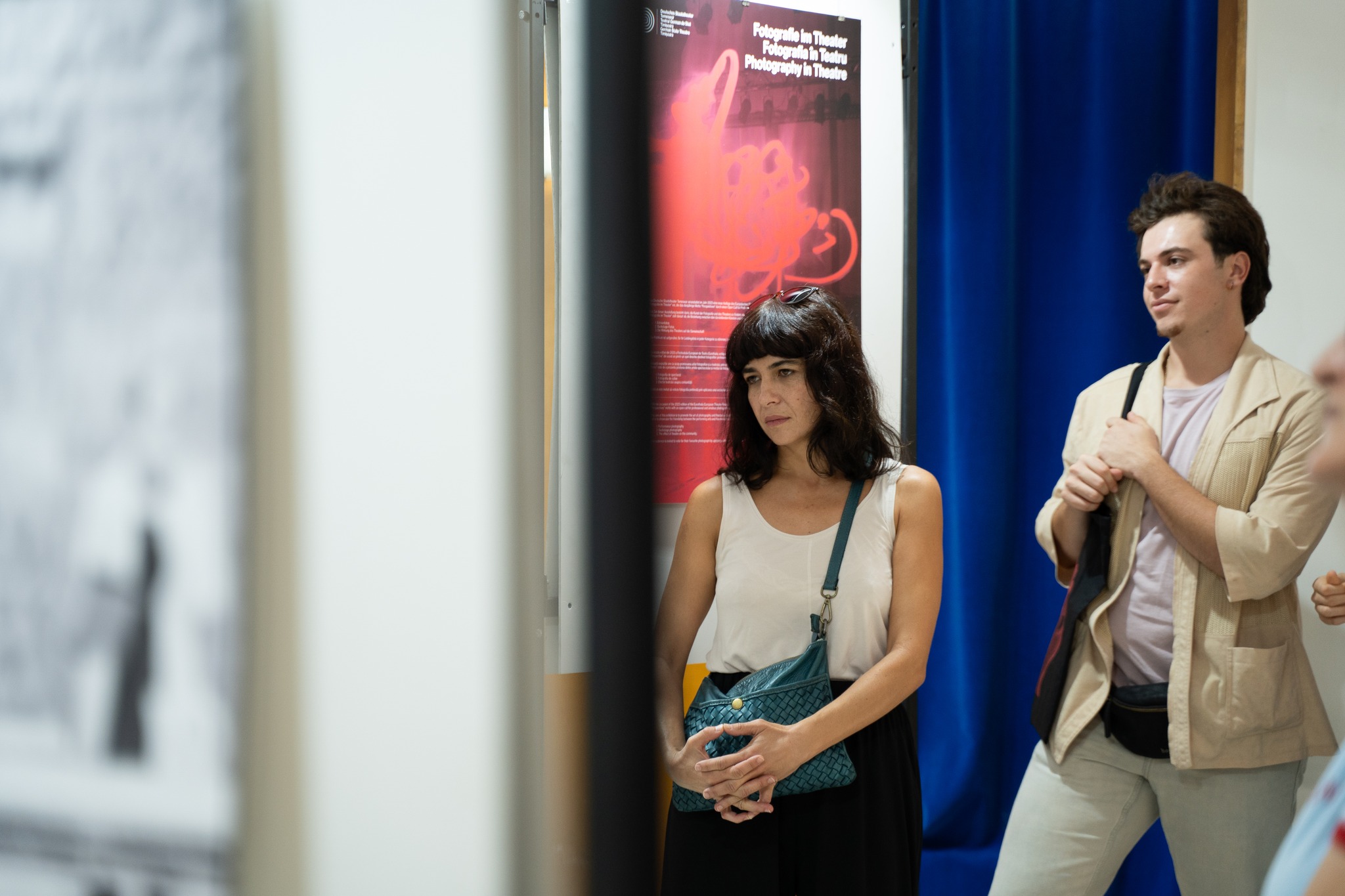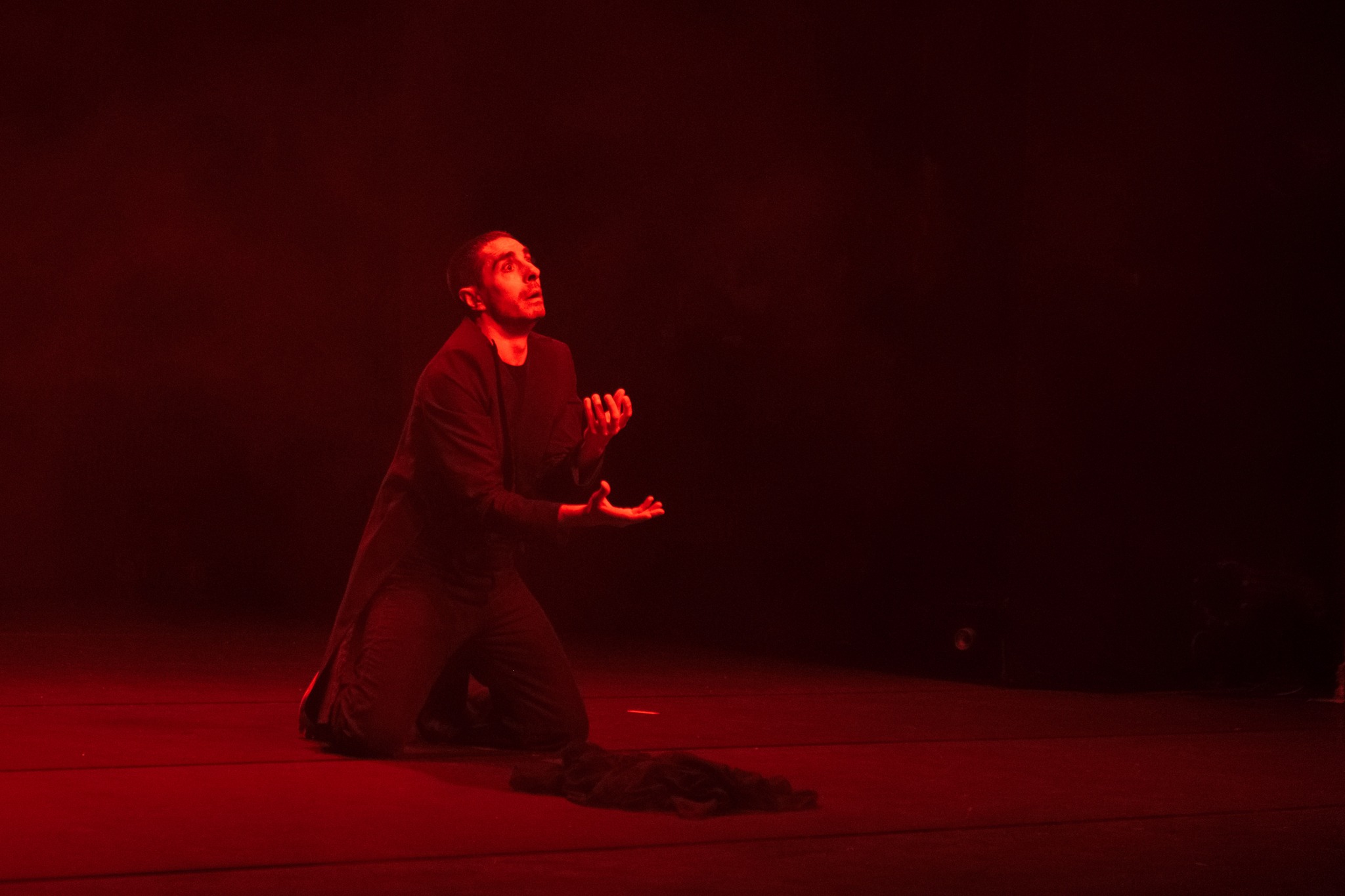
"Theatre Is Anachronism. It's All Caricature.” Interview with Prof. univ. dr. habil. Eleonora Ringler-Pascu
2 October 2023
Interview by the Ph[r]ases programme team
The Austrian playwright Thomas Bernhard calls
himself “ein Störenfried” (a
troublemaker). Does his work justify this label?
Thomas Bernhard has the fame of a “rebel”, a “mannerist
of grief”, a “cheerful tragedian”, a “virtuoso of despair”, a “misanthrope”, a “provocative”
writer, labels faithful to the theme approached and to the style of writing
prose and theatre. In the world of the stage, as the Austrian playwright
creates it, the characters are overwhelmed by tragicomic situations and must
finally recognize the failure to which they are subjected. The specific method
of exposing the process of disintegration and failure consists of verbal and
gestural stereotyping, and puppet automatisms, achieved by emphasizing
tragicomic, grotesque situations, close to hilarity. Bernhard's speciality is
the relationships of sick interdependence, harmful attachments, and infirmities
that condition themselves to annihilate themselves in the end; in fact, a “love-hate”
psychoanalysis, the finality of these relationships is always a failure. These
are my thoughts and observations set out in the afterword entitled Thomas Bernhard – the theatre of failure,
from the volume Thomas Bernhard: Immanuel
Kant, published by the Diacritic Publishing House in Timișoara in 2013.
If we refer to
the term "Störenfried", it overlaps
with the labels conferred on the Austrian writer, he is a rebel who provokes
through the theme approached, by fictionalizing various social and political
situations and truths, which has led to several scandals, even lawsuits from
people who have "recognised themselves" in his writings. But as the writer has the right to fictionalize, to
transform reality from his perspective, it is obvious that he has won all the trials,
or the accusations have been withdrawn... I would not associate “ein
Störenfried” with the meaning of “a problem
child”,
but rather with “troublemaker”, Bernhard being the
controversial author who disturbed the peace in Austria by his vehement
position towards “-ism(s)”, i.e. neo-Nazism,
Catholicism, anti-Semitism, xenophobia, racism, extremism.
The characters in his works often give the
feeling of isolation/alienation. Why does Thomas Bernhard explore such topics
in his writings?
The characters of Bernhard are often the mirror
or even the reflection of the playwright's frustrations, of the traumas he has
experienced. The autobiographical vein is always present, both in his prose and
in his dramatic texts. If we refer to the central theme of his dramatic texts,
it captures the isolation and failure of the individual in an indifferent,
meaningless world, in a desperate attempt to overcome the self-imposed
isolation that leads him to failure, madness or even self-destruction. The
characters are generally isolated, and I refer especially to the male
characters, because they dominate Bernhard's world, with a few exceptions, one
of them being Am Ziel (Destination).
It can be noted that the heroes are loners, complexed, destroyed by physical or
mental suffering, who refuse to communicate with their peers, condemn
themselves through their behaviour to helplessness and fatalism. Most of the
central characters are represented by perfectionists, animated and obsessed
with unrealizable, utopian ambitions, the result being that they are crushed by
the burden of their own daring. And we come again to one of the keywords for
Bernhard's plays: failure.
Literary criticism often places him in a
nihilistic area. Can we better understand Thomas Bernhard by reading the
Nihilists?
In order to understand Thomas
Bernhard, it is preferable to read his texts, narratives, and dramas, then to
read his biography, which completes and also represents a key to receiving his
work. Even if the Austrian playwright was a very good connoisseur of
philosophy, from Kant to Wittgenstein, from Nietzsche to Heidegger, including
Cioran, the nihilistic note derives rather from his pessimistic position on
history, because one can deduct from the relationship Austria = Catholicism =
Nazism, a relationship that motivates the vehemence with which he attacks the
Austrian mentality, especially anti-Semitism. The play Heldenplatz (Heroes’ Square) is the most relevant from the point of
view of the message because it is placed between political allegory, realistic
theatre, with critical accents and shades of parody – a theatre of
uncomfortable introspection, in which the main character is, in fact,
conscience. The endless discussions of the protagonists focus on the tragedy
produced, I refer to the annexation of Austria by Nazi Germany in 1938,
celebrated in the Heroes' Square in Vienna. Bernhard draws attention to the
danger that history may repeat itself if radicalization trends are not stopped,
taking into account the known conflicts in Austria with the representatives of
the FPÖ party (Freiheitliche Partei Österreichs =
Freedom Party of Austria), at that time, the most famous protagonist being Jörg Haider.
From here derives the pessimistic thinking on the course of history, because
this populist party of extreme right of nationalist-authoritarian orientation
has gained many followers over time. In the face of this state of affairs,
there is no other form to react than that of protest and rebellion, even if it
manifests itself in a radical form. This explains the playwright's drastic
reaction, his revolt that manifests itself through provocation, finding its
most effective form of manifestation on the theatre stage.
Where should the discovery of Thomas Bernhard's
work start, especially for young people? What texts would you recommend?
First of all, I would
recommend reading the stories and dramas of Thomas Bernhard, those that capture
the micro-theme of his novels and plays. Some have even been translated into
Romanian: Yes, Extinction, The Theatre Maker (correct it would be: The Theatre Creator ), Cold, Immanuel Kant, In hora mortis,
Simple complicated, Old masters – the titles of the volumes
that have appeared at the Art, Călăuza, Diacritic, European Institute and
Paralela 45 publishing houses. Let's not forget that Bernhard has been present
on the theatre stages in Romania since 1979, but especially in recent years,
there has been a real boom of
productions with his plays. In this regard, I have undertaken a study, and thus
I can list a large part of the staging, which are included to a certain point
in the volume with the translation of the play Immanuel Kant (2013): Minetti and Before Retirement at the Teatrul Mic in
Bucharest, The Power of Habit and Before Retirement at the “Mihai
Eminescu” National Theatre in Timișoara, The
Hunting Society at the Hungarian State Theatre in Cluj, The Power of Habit at the "Sică Alexandrescu" Theatre
in Brașov, SatisFUCKtion (Destination)
at the Teatrul Foarte Mic in Bucharest, Immanuel
Kant at the “Csiky Gergely” Hungarian State Theatre and performance-reading
at the “Eugen Todoran” Central University Library in Timișoara, The Creator of Theatre at the ACT Theatre in Bucharest.
Am
Ziel. A destination? An
ambition? A purpose? (all these nouns stand for the possible translation of the
German word "Ziel")
In fact, the phrase “Am Ziel” would rather identify with reaching
the destination, from an etymological point of view. But in the context of
Bernhard's play, one can interpret it faster with “purpose” – because none of the characters succeeds in
achieving their much-desired purpose in life. In reality, we are dealing with
the history of a family, the destiny of which is told in the form of the
monopolizing monologue of the mother, which gives her security and the power to
control everything that happens around her. Speech itself functions as a
language stabilization mechanism, and the entire atmosphere oscillates between
comedy and tragedy: the human despair around which everything focuses. The
appearance of the young writer, who is invited to spend a few days at the
seaside with the two protagonists, the mother and the daughter, causes anxiety,
a strong allusion reflected by the play of this playwright entitled Rette sich wer kann (Save yourselves if you can).
The central character of Am Ziel (Destination), the mother (played by the actress Dörte
Lyssewski) seems to be engaged in a monologue rather than in a dialogue. What
effect does the author want to achieve through this type of approach?
In the play Am Ziel, the verbal comic and the irony
introduce the entire action, which gradually takes on tragicomic nuances. It is
noted again that Bernhard varies one of his central themes with X-ray vision
and grotesque-comic frenzy: the self-hatred of his protagonists, for the lives
they perceive as hopeless traps. The “monstrous mother”, portrayed by the Austrian
playwright, takes on deep dimensions and is virtuously interpreted by the
actress Dörte Lyssewski. The two anonymous protagonists, simply called “mother” and “daughter”, are in a relationship of
constant dependence, moving for thirty-three years between their villa in the
Dutch city and their summer residence in Katwijk, on the seafront. Bernhard
thus takes the opportunity to give the floor to the dominant mother, because
she controls the entire action, which grows from reproach to reproach – thus, she defames the world, her own family (her
husband and her disabled and deeply hated son), her daughter, the theatre
evening with the premiere of a play by a young dramatic writer that she had
invited to the holiday residence. And so, it turns out that none of the three
protagonists achieve their "goal" – the mother cannot part with her past that she hates, the daughter cannot
free herself from the dominant mother, and the writer cannot engage in a
relationship with the daughter. So, they all sink into passivity and get caught
up in their addictions and monotonous existences. Bernhard's play can be read
and understood in many ways: as a mother-daughter psychological drama,
generational drama, matrimonial drama or as a poetic meta-play on theatrical
creation.
Thomas Bernhard grew up without a father,
suffered from various health problems and had a tumultuous life, being forced
to become a member of the Hitler Youth (Hitlerjugend).
This way, can such autobiographical elements be found in Am Ziel?
Am Ziel captures certain autobiographical elements, first of
all, if we consider the geographical area - the Netherlands –, the country
where Thomas Bernhard was born and where the action of the present play takes
place. The childhood traumas and the disease are topos present in the play, if
we think about the infirmity of the son, respectively the mother-daughter
relationship that reminds us of the Pianist (Die Klavierspielerin) of the Austrian
author Elfriede Jelinek.
Regarding Bernhard's joining the Hitler youth:
this aspect is not discussed in the play, instead it becomes a theme vehemently
and insistently discussed in relation to right-wing extremism in other dramatic
texts, as the playwright's hatred of Nazism and its contemporary forms of
manifestation are well-known.
Reading Thomas Bernhard, we discover a complex
relationship with the Austrian society, the playwright expresses criticism
towards it. Does it reflect in Am Ziel?
Thomas Bernhard's work is part of the literary
canon that addresses specific Austrian issues, but also themes that are far
from the Austrian context. His plays carry with them the Austrian tradition,
history and ideology, which address and concern both European and non-European
audiences. It is known that the writer repeatedly rebels against anti-Semitism
in Europe, against the Nazi past, against the possible return of this power,
directly criticizes the Austrian society, ignorance, passivity, populism, etc.
Instead, Am Ziel being set up/located
in the Netherlands, the critical aspects are only indirect allusions to the
Austrian reality.
The text Am
Ziel was written in 1981 and premiered the same year at Salzburger
Festspiele. How can you explain the success of the text in Austria, even 42
years after its appearance?
Thomas Bernhard is an uncomfortable author, but
his dramatic texts are a touchstone and a challenge for directors and actors.
The presence on the world stages is due to the unmistakable style of the
Austrian playwright.
Director Matthias Rippert creates a static show
with few props and little action, and the focus is on the text. Is this
directorial style characteristic of the Austrian stage?
The staging of the young director Matthias Rippert, present with his
directing proposals in various theatres in Germany and at the Mülheimer Theatertage theatre festival, stands out in the Burgtheater's production through minimalism. The
static element derives from the so-called “Sprechtheater” (spoken theatre), the
action being extremely reduced, highlighted by the director's vision, who
preferred a minimalist formula for all levels (scenography, lights, sound). Only the word, the power of
the word, is the one that places itself in the foreground and puts to the test
the actors who take over these impressive scores, because Bernhard gives up the
interpunctuation, which gives a certain freedom, but also requires extreme
concentration. The actress Dörte
Lyssewski faithfully renders the specific Bernhardian style, that repetitive and
deeply musical structure, in which each idea is caught, followed, and developed
in a crescendo, like an infinite spiral, leading to paroxysm. Obviously,
Bernhard's dramatic texts allow, despite the specific minimalism of the action,
memorable, electrifying performances, if we think about the staging of Dabija
with the Theatre Creator, a real
jewel that remains in the repertoire of the theatre Teatrul ACT since 2001, as
the show has become an ars dramatica of
this independent theatre.
Regarding the directorial style characteristic
of the Austrian stage, I can only emphasize the fact that each director comes
with his own vision, with his own proposals. This is, in fact, where the
fascination for those directors who know how to challenge every time through
their original vision derives from.
Does the Romanian audience resonate with this
type of show/text? What is the target audience?
The audience
is the one who can resonate or not with a show. The subjective factor is the
one that decides on the reception. As I have already mentioned, Thomas Bernhard
is a playwright known to the Romanian audience due to the various performances
of his plays, so I would conclude that he addresses all theatre lovers, even if
his texts are more difficult, demanding, sometimes uncomfortable, but suitable
for the stage, because “theatre is
anachronism. It's all caricature”, as one of Bernhard's protagonists argues.
---
"Ph[r]ases"- Creative Formulas is a
programme conceived by Diana Katharina and Daniela Șilindean together with the
team of the German State Theatre Timișoara, dedicated to the theatre chronicle
within the Eurothalia 2023 European Theatre Festival, held between 20-30
September 2023, financed by the National Cultural Program Timișoara - European
Capital of Culture in 2023.


